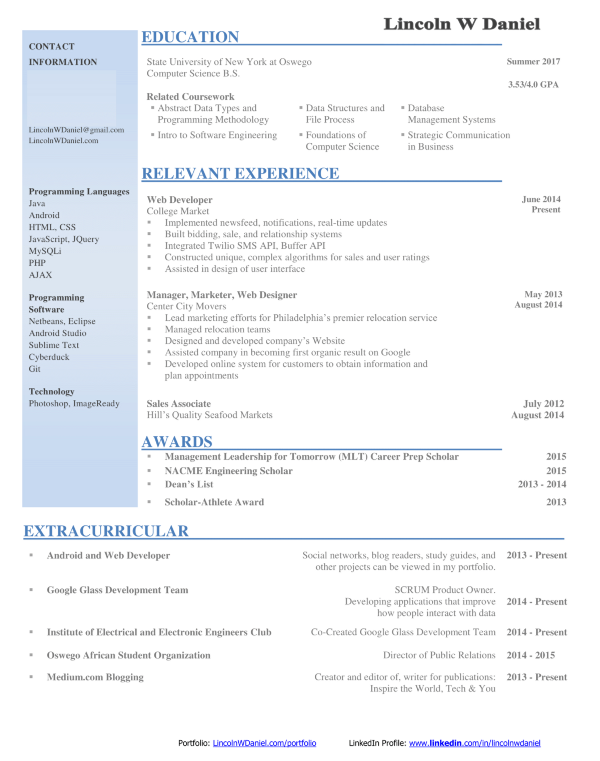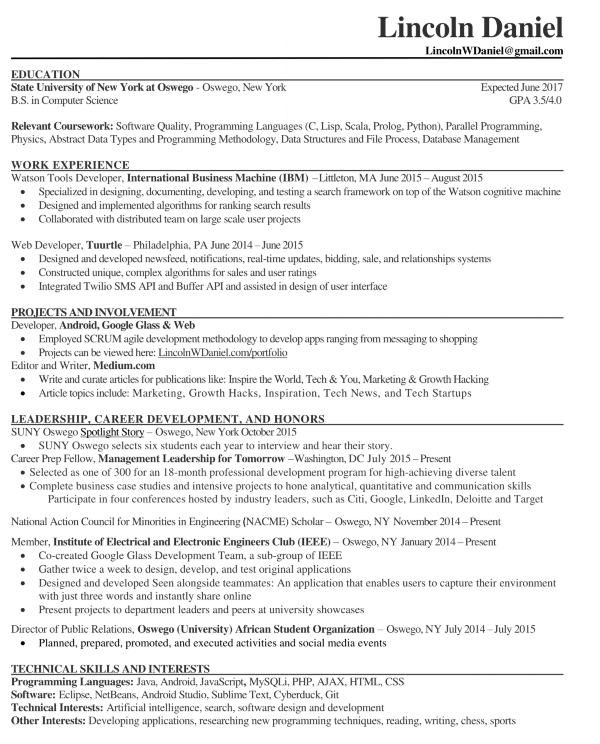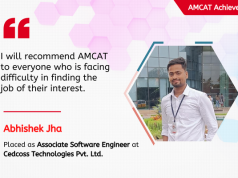In August of 2013, I decided to be a marketing major because I was afraid of the engineering related math. A semester later, a friend convinced me to get through the math, and I decided to switch to computer science (CS) because I wanted to develop software to enable people to accomplish their goals more efficiently. Since then, I’ve been fortunate to have the opportunity to work with great people on incredible things at companies like IBM and soon to be Medium. Now I’m writing this piece to help others get to where I am by sharing some tips I learned along the way.
This piece is a bit long, so here’s what it covers: how I went from not knowing much about programming to gaining experience before internships, how to make yourself a great candidate for employers, and a quick run at how to build a resume that will catch eyes. Sure, my approach at the game won’t work for everyone, but it’ll help everyone get started.
I intend to inspire you to keep going and work hard to achieve what may currently seem impossible. Two years ago, I wouldn’t have thought I’d ever be writing a piece like this. I hope this helps you in preparing for and executing your job search.
Skip to the bottom to view my résumés …
From Newb to Intern in 365
A year after becoming a CS major, I had only applied to one company in February, 2015, of my sophomore year at SUNY Oswego. I also put my résumé online in a large index alongside other engineers and a couple weeks later, IBM Watson reached out to me. I went through the process in March and received an offer on a Wednesday in April. That same day, I received an email from NASA expressing interest in interviewing me for an internship with JPL. Finally, on that same Wednesday, the only company I had applied to turned me down after months of waiting, but that’s a story I won’t be sharing here.
While the offers from IBM and NASA were equally competitive, I chose to go work at Watson for my first internship because I have a large interest in artificial intelligence; I’m even building my own AI Android app to assist humans with communication (its in beta and I’m interviewing for co-founders). This is where I admit my title is a bit misleading because I never interned at NASA given that I chose IBM instead, but I needed to get you here somehow 🙂
How I Did It & How You Can, Too
Its not often that a sophomore gets an internship, especially in the tech industry, so I was fortunate for having great mentors and friends (shout out Jordan Smith) to help me effectively prepare to succeed. Robert Ingersoll suggests that, “ Hope is the only bee that makes honey without flowers,” but I strongly disagree because hope doesn’t make anything. Anyone who knows me knows I don’t enjoy sitting around and hoping that all goes well in the future. Instead, I build.
The rest of this piece is not to imply that jumping into the tech industry will be easy. Nothing worth doing is easy, but it surely will be worth the late nights, headaches, and sacrifices. After it all, you’ll be where you want to be.
Build Projects to Gain Experience
Companies always ask for years of experience, so how is a freshman to satisfy that initial requirement? Build, build, build. You learn by doing and you build the experience necessary for employers to take you seriously.
The summer after my first year in college, I quit my job at a seafood market to learn how to build a social marketplace for students. I didn’t know anything about building web apps, but I believe in self learning, so I went online and learned from Google and vloggers. After two weeks I had a prototype of Tuurtle which enables students to buy and sell anything safely and locally. Its a huge system that grew as I learned more about the LAMP stack and APIs like Twilio. I worked on it all of summer for at least 20 hours a day. At the end of the summer, I launched it at my school and tossed it on my résumé.
This would go on to prove as enough experience for IBM and NASA to make me competitive offers for an internship a few months later during the first semester of my sophomore year. Aside from companies taking notice, an engineering fellowship took notice and sent me a scholarship. You already know I tossed that on my résumé.
Another project was my own website, LincolnWDaniel.com, which I initially built from scratch but decided to clean it up with Webflow. Other projects were from software jobs on Fiverr, large school projects like an Android app that clones StackOverflow for universities which I built in a class group project, independent projects from teachers, and anything I felt was a large enough project with notable experience. Another one?
Go the Extra Mile
Another thing those who know me know is I don’t enjoy doing what everyone else is doing. Why? Because I’d end up how everyone else ends up. By now, you know I wouldn’t like that. So I did the things others wouldn’t. I gave up some sleep, I gave up hanging out with friends after class everyday. I left my girlfriend four hours away, in my hometown of Swarthmore, PA, so I wouldn’t be distracted. I limited myself to four parties a semester. I convinced my school to pay for Google Glass for my buddies and I in our IEEE club to build on, a chapter of the Syracuse region. Its also worth noting that I was a founding member and leader of that IEEE club, but you don’t have to be; just join a notable engineering club. If you’re a minority like myself, apply to organizations like Code2040 (CODE2040) and Management Leadership for Tomorrow — I’m a 2016 Fellow of both — which have large lists of Fortune 500 partners from Google to the CIA looking for minority talent to diversify. Read Cracking the Coding Interview to prepare for the battle. Finally, apply to as many companies as you feel you can fulfill the duties of and would enjoy working with.
Fail Fast & Iterate
All in all, I failed a bunch during the last two years, especially in the first year. However, I learned quickly and kept applying my learnings to the next iteration of myself and my résumé. You can always do better regardless of where you are in any domain.
There was a point where I struggled understanding stacks and linked lists. This past semester, I took parallel programming with Doug Lea (he led the development of Java’s concurrency library) and did better than expected in one of our toughest classes to maintain my GPA, but it wasn’t always that way.
When I was rejected by that first company, even before I received the rejection email, I knew I had messed up somewhere. I knew it wasn’t my grades, so it had to be my résumé. I had my teachers, friends, mentors, and anyone with experience in the industry review my résumé to help me make it better.
Be Versatile, Passionate and Let It Show
Over anything else, your passion will carry you through. Show passion for all that you do and do only what you are passionate about. Along with that, be versatile. I have poured myself into everything that I’ve done.
I run a Marketing and Growth related publication here on Medium which I started during my freshman year and have grown it to be one of the largest in its area with over 10k followers at the time of publishing this with at least 9k of that coming in the last six months. Why? Because I have a passion for marketing. Employers love versatility. Show that you can do more than code.
My greatest passion is in developing software to enable people to accomplish their goals more efficiently. So I’ve been doing that since I started less than two years ago.
I enjoy writing and sharing knowledge, so, evidently, I do that when I can. I’m even writing a book right now to teach Java to beginners by connecting coding to real life experiences. I will go on to share that on Youtube as the ModernNerd while I assist teaching my school’s Foundations of Programming course next semester. I have also written a book, Java for Humans, to teach beginners how to program in Java by relating programming concepts to life experiences.
People often think that those who achieve success at any level are special and not ones to be matched or surpassed. That’s never been the case. You are every bit as capable of succeeding as I have been in my internship searches. You have all the tools I do and all the knowledge of the universe available to you through Google. I am largely self-taught and as you grow in this field, you will have to teach yourself new things everyday. Maintain your passion and it’ll all work out with hard work.
Summary
To succeed before you are given a chance, you need to give them a reason to give you a chance.
Start building projects in your free time to build your resume. Join organizations such as the CS association at your school. Apply for relevant scholarships and fellowships. If you do that, your resume will write itself. Finally, take a look at my resumes and others online to write your own in an effective manner. It is important that you have multiple eyes review your resume. Through it all, your projects and experiences will be what get you the job, so focus on that first. You are on your way to a great summer. Keep up the work. Once your resume is ready, apply for as many jobs as you feel you’ll enjoy fulfilling the responsibilities of.
Finally, if you are interested in learning Java to program mobile applications, I spent my winter break writing a comprehensive book on Java that covers all the concepts taught in introductory Java courses in more easy to understand and relatable ways. Read it for free here and learn more at JavaForHumans.com.
My Resumes
Here are the résumés that helped me gain offers to internships. Thanks to my résumé and everyone who helped me create it, I have interviewed with many companies with many of them being the sexy ones from Airbnb to Pandora and Box. I performed poorly in a some, well in others, and exceptionally in the few that paid off.
I hope this helps you improve your own résumé for your internship or full time search. Take away from it what you want. I welcome any feedback on the most recent one as I am also interested in learning from you. The PDF to the latest one can be found on my website for you to convert to Word and use as a template for your own résumé if you so wish.
I look forward to spending my time at A Medium Corporation this summer to better enable writers to write and readers to read.
Spring 2015: 3 Interviews, 2 Offers
Resume Dos
List relevant past work experiences. If you have none, list your large, relevant projects as your experience. Provide link to your website and LinkedIn. List relevant organizations you’ve been involved in. List educational courses. Employers want to see that you are taking relevant and tough classes and are excelling.
List GPA if at least 3.0. If your GPA is below that, you can show it but it may hurt you if the rest of your resume does not make up for it. Make it clear what your technical skills are and make it easy to find.

Resume Don’ts
List all experiences in detail. Tech employers won’t care about the details of your retail job unless you did something extraordinarily relevant.
List Microsoft Office suite as knowledge unless you are looking for a business related job such as accountant.
If you’re pressed for space, don’t list every bit of detail on projects and work experience.

(This article originally appeared on Medium as written by Lincoln W Daniel)


























